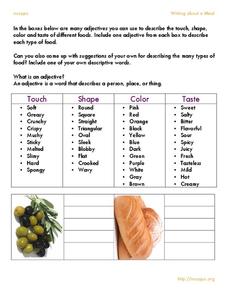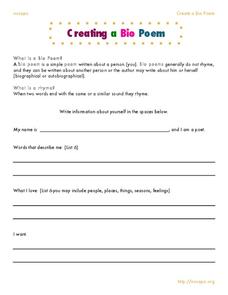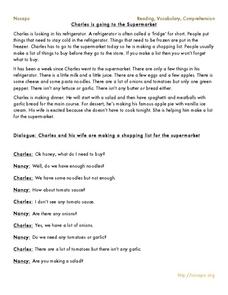PBS
Why Do We Have Seasons?
Explore the reason for the seasons! An interactive lesson allows learners to explore the earth's rotation from the viewpoint of four cities at different latitudes. It provides descriptive information at eight points during the orbit...
Nosapo
Writing about a Meal
You don't need to be a food critic to describe your meal accurately! A series of activities introduce learners to vivid adjectives when writing about the taste, smell, and feel of food. After working with word choice, parts of a...
Nosapo
Creating a Bio Poem
Find out what's special about your pupils with a fun biopoem activity! As they fill out their name, words that describe them, what they love, and what they dream of, learners create an expressive poem about themselves.
Nosapo
Reading, Vocabulary, Comprehension
Whether you teach mainstream elementary classes or older English learners, a set of reading comprehension resources is a great addition to your language arts curriculum. Ten activities each include a reading passage and set of...
NPR
Share and Reflect
Would you have done anything differently? Groups publish one-minute videos on their engineering solutions to the plastic problems. They self-reflect on their work throughout the unit.
NPR
Communicate the Solution
Communication is key. Scholars produce videos to highlight their engineering solutions to the plastic problem in the ninth installment of the series of 10. Feedback from other groups lets them improve the videos.
NPR
Iterate to Improve the Prototype
Strive for perfection. Based on peer feedback, groups identify ways to improve their prototypes of the solution to the plastics problem. Members must come up with at least two ideas for improvements. This is the eighth instructional...
NPR
Test and Evaluate the Prototype
Time to test the prototype. Groups test their prototypes to the plastics problem under consideration. The results of the tests and peer feedback offer a means to refine the prototype.
NPR
Prototype the Solution
It's always nice to see what the solution looks like. Groups build a prototype of their solution to the plastics problem in the sixth installment of a 10-part unit. The prototypes can be either a visual prototype or a working prototype.
NPR
Brainstorm and Evaluate Solutions
May the best idea win. In groups, scholars brainstorm solutions to the problem statement developed in the previous lesson. The best idea moves forward to the prototype stage.
NPR
Identify Criteria and Constraints
What defines success? The fourth installment of a 10-part series focuses on the criteria for engineering design success in solving the plastics problem. Pupils also consider any constraints.
NPR
Define the Plastic Problem
Individuals identify a specific problem concerning plastics and write a problem statement, which describes the problem, explains why it's a problem, and identifies desired solutions.
Nosapo
Pronouns: Personal Pronouns, Demonstrative Pronouns
Which do you use: that or this? Which or where? Me or I? Practice pronoun use with a series of activities that focus on personal and demonstrative pronouns.
Fluence Learning
Writing an Argument: The NIEHS
Should the work of the National Institute of Environmental Health Sciences be funded by the government? Middle schoolers weigh in on the status of federal funding for programs that protect the environment with three text passages and...
Fluence Learning
Writing an Argument: Persuasive Speeches to Students
Powerful orators make their messages compelling with a combination of factors. Learn how to be an inspirational speaker with a reading assessment activity that presents a list of persuasive speaking techniques, as well as two speeches...
International Technology Education Association
Become a Weather Wizard
Accurate weather forecasting is something we take for granted today, making it easy to forget how complex it can be to predict the weather. Learn more about the terms and symbols used to forecast the weather with an earth science lesson...
Institute for Energy and Environmental Research
Practice with Scientific Notation
Zeroes are more important than they look! A guided practice activity takes learners through the process of both scientific and decimal notation, culminating in more complex word problems and equations.
Fluence Learning
Writing About Informational Text: Beyond the Beyond—Galaxies
Everyone has a different point of view, even when it comes to the enormity of the universe. Two separate text passages explain the scope of a galaxy, prompting young readers to write an essay about each author's argument and how the...
Fluence Learning
Writing Informative Text: Did Shakespeare Write Shakespeare?
William Shakespeare penned some of the richest and most fascinating works of literature—or did he? Middle schoolers read three brief informative passages and conduct additional research to evaluate the claim that Shakespeare did not...
American Battle Monuments Commission
The Strategic Bombing Campaign
An extensive look at World War II details the strategic bombing campaign of the Allied forces. Beginning in September 1939 and ending in May 1945, the interactive map follows British and American forces throughout the bombing campaigns...
Fluence Learning
Writing About Literature: What Is Happiness?
Jack London's heart for adventure has come to define the spirit of America and its frontier. Selected passages from the foreword The Cruise of the Snark take eighth graders through London's construction and voyage of his ship before...
Fluence Learning
Writing an Argument: Is Electronic Communication Helpful or Harmful?
Technology has undoubtedly improved the lives of people around the world—but has it improved communication? Seventh graders read two informative passages about the rise of texting and emailing versus in-person conversations before...
American Battle Monuments Commission
The Meuse-Argonne Offensive
America's entrance into World War I drastically changed the scope of the conflict. An interactive map and timeline takes learners through the Meuse-Argonne Campaign, which lasted from September 26, 1918, to the eventual German armistice...
Google
Online Safety Roadshow Activity
What does it mean to have digital citizenship? A set of lessons teach middle schoolers how to be safe and productive online. From sharing posts to creating secure passwords, learners discuss the importance of remaining diligent—and...

























